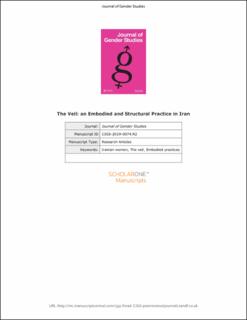| dc.description.abstract | In this article, drawing on Butler, Bourdieu, and Foucault, I examine the veil as an embodied and ethical practice. More particularly, I look at the way in which embodied subjectivities are (re)constructed and contested in the process of socio-cultural and political developments. I trace briefly the politics of the veil in the Iranian context during three historical periods. In light of the notion of embodied subjectification, I seek to reveal the meanings that are ascribed to the veil through imperatives enforced by the Iranian state, and highlight the diverse ways in which the women (re)appropriate and subvert veiling practices through ethics and forms of self-constitution. In so doing, I depict the relations of power that the embodied subjectivity of women is dependent upon, and redefine women’s subjectivity as their capacity to act in ways that may entail specific relations of subordination. | en_US |
